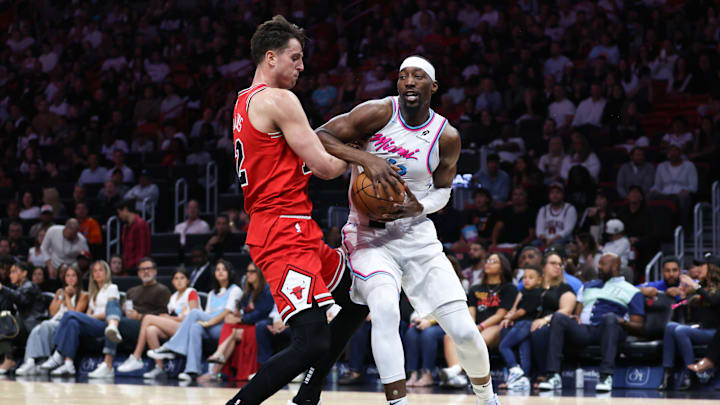Although it won't be the most entertaining or notable position battle, the Chicago Bulls' backup center role is up for grabs. The Bulls roster features two compelling options—Jalen Smith, who signed a three-year, $27 million contract last offseason, and Zach Collins, who came to the Windy City midseason via trade.
Smith, unlike Collins, was brought to Chicago willfully. The Bulls signed Smith after he enjoyed a career season, in which he averaged 9.9 points, 5.5 rebounds, and 1.0 three-pointers in only 17.2 minutes per game for the Indiana Pacers. Moreover, Smith converted 59.2 percent of his field goals and 42.4 percent of his triples. The big man's 68.2 true shooting percentage ranked 22nd among 572 players to suit up in 2023-24.
On the flip side, Collins was merely a salary-matching throw-in when the Bulls unloaded Zach LaVine’s contract. After signing a two-year contract extension with the San Antonio Spurs for $35 million, Collins initially impressed—averaging 11.2 points, 5.4 rebounds, and 2.8 assists per game in 64 appearances in 2023-24.
Nonetheless, as the Spurs continued to build a well-rounded roster around budding superstar Victor Wembanyama, Collins' playing time decreased. The Gonzaga product averaged less than 16 minutes per game in each of his first four months of the 2024-25 season.
Zach Collins impressed after being traded to the Bulls
Consequently, Collins totaled 4.6 points, 2.8 rebounds, and 1.4 assists per game, shooting only 46.2 percent from the floor in San Antonio before being traded. After arriving in Chicago, Collins didn't see much action either. He was a DNP-CD in two of his first three games before cracking the rotation when starting center Nikola Vucevic went down with a calf strain in late February.
In an expanded role, Collins quickly proved his value in Chicago. In 12 games as a starter, the 6-foot-11 center averaged 14.3 points, 8.2 rebounds, and 2.5 assists per game, all while shooting 58.5 percent from the field.
As a result of Collins' sudden ascension, Smith saw a decrease in playing time. The former Terrapin averaged a season-low 12.6 minutes per game in February, yet he dazzled with efficiency. However, as the year progressed, Smith shot worse and worse from the field. He converted only 44.4 percent of his field goals in both March and April and hit on less than 25.0 percent of his attempts from long range.
Thus, Collins had supplanted Smith on the Bulls' depth chart. Not that it was drastically different, but Collins even saw two more minutes than Smith did in the Bulls' Play-In Tournament loss to the Miami Heat.
With the 2024–25 season now in the rearview, the Bulls face the aforementioned position battle—though in reality, it shouldn’t be a battle at all. Even though Smith still has two seasons remaining in Chicago after signing a three-year deal in 2024, Collins is far more valuable, especially on the defensive end.
Collins' defense is a necessity in Chicago
The Bulls were notoriously shoddy on the less glamorous end last season, fielding one of the worst defensive units over the first half of the season before turning it around following the All-Star break. Yet, it's fair to question Chicago's late-season surge, considering the final fourth of the NBA season is typically reserved for tanking or contending, with hardly an in between—sans the Bulls.
Still, Collins' defensive metrics are impossible to ignore. Opponents shot 3.5 percent worse from the field when Collins was the primary defender. By contrast, opponents actually shot 0.1 percent better against Smith. Within six feet, Collins was even stingier. He held opponents to a 9.0 percent decrease in shooting, while Smith limited his matchups to just 6.0 percent worse around the rim.
Among all Chicago Bulls, Collins placed first in CraftedNBA's catch-all defensive metric, CDPM (Crafted Defensive Plus/Minus), at 1.3, whereas Smith came in at seventh, at 0.1.
Lastly, Collins' on-off splits are off the charts. The Bulls were 10.0 points per 100 possessions better defensively with the former Spur on the court. That placed in the 98th percentile. Smith, although not a detriment, was closer to average. Chicago was 0.3 points per 100 possessions better defensively with Smith on the court—a stat that ranked in the 53rd percentile.
Opposing teams shot much worse from the floor (minus-2.9 effective field goal rate) and turned it over at a higher clip (plus-2.4 turnover percentage) with Collins on the hardwood. Both statistics ranked near the 90th percentile league-wide.
Despite being a potential trade chip, considering he's only on the books for one more season, Collins' place in the Bulls' lineup should be secure. He might not theoretically be as much of a floor-spacer as Smith, but his defense should prevail 10 times out of 10 for a team in need of defensive stoppers.
